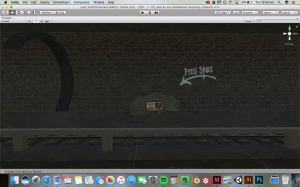
The first thing that the character encounters in the game is the radio. The entire narrative of the game is built around the radio as it is the characters only communication and interaction with another person. When she picks up the radio, it appears as a graphic in the player GUI.
This is done by simple code that changes the transparency of the image so that it ‘turns on’ when she picks up the radio. The code is set up so that only when she is ‘within range’ of the radio can she press SPACE to pick up the radio.
1860 – 1880
When building the platforms for each period of time I wanted to make reference to all of the important events that happened to the London underground during that time. The majority of the models for the platforms I downloaded for free from TurboSquid. The full list of models used will be documented in the bibliography. However a lot of the models that I used did not come with the appropriate textures, so I had to retexture a lot of the models that I used to suit my purposes. Luckily one of the things that the London Underground is known for is advertising. The underground has always been a source for posters and artwork to be displayed. The underground itself has also gone through a clear design evolution. When building the platforms I tried to emulate this as much as possible by including posters and design trends from each period.
The first station was a challenge as the ‘Undergound’ that we know of today hadn’t officially been established yet for the majority of this period, therefore there was little to go on without moving too far away from the London Underground itself. I chose to decorate this platform in an old ‘Steam’ age style. I added the grime to the ceiling to show all of the soot and dirt that would have been caused by the traditional steam powered locomotive trains. I also used a particle system to create a steam wall that the player can not pass through until they ‘turn it off’ via the valve on the generator model. The remaining models are general industrial items to decorate and a poster about the metropolitan railway from 1862.
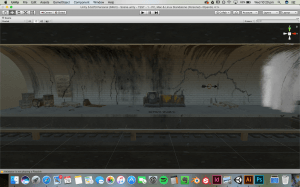
The code that causes the interaction between the player and the wheel to turn the steam off is made up of a number of different scripts.
First there is the script that detects whether the character is within range of the wheel to turn it, by pressing SPACE. Also attached is the audio of her turning the wheel.
Then there is the DESTROY script which disables the particle emmitter and deletes the collider on the object that prevents the player from moving through it.
There is also a ‘PushBack’ script attached to the steam so that if the character goes into the steam when it is on. The character will be ‘pushed back’ away from the steam, as if hurt. Also attached is the audio of the player saying ouch! and the noise of the steam itself.
1890s – 1900s
The following sections of the platform move through the 1890s when The City and South London Railway opened the world’s first deep-level electric railway, introducing electricity to the underground this is symbolized by the addition of lights and wires across the platform walls and a metal power box model containing electrics.
I have also added other important features of the period such as the first appearance of the famous roundel symbol and the name ‘Underground’. There is also one of the first proper ‘Underground’ map published in 1908. In addition are some posters from the era:
The style of the platform is inspired by the picture below of a platform at Liverpool Street in 1912.
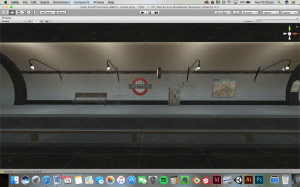
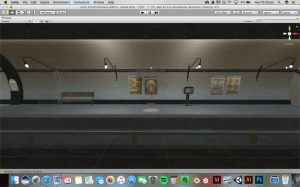
1910 -1930s
This station platform is very similar to the previous because although a lot of electric underground railways were built in this period and all of the old steam underground lines were electrified the style of the platforms didn’t really change that much.
However, there was a great increase in advertising as they needed to encourage people to actually use the new underground electric railways. So I have included posters from the period that do this.
There is also the Harry Beck’s 1933 diagram of the Underground map framed for people to see.
In 1911 London’s first escalators are installed at Earl’s Court station. I symbolized this by adding some gated off escalators in the background and a poster about the new additions.
In 1929 the last manually-operated doors on Tube trains are replaced by air-operated doors. In the audio ambiance of this platform a man can be heard shouting ‘Mind the doors’.
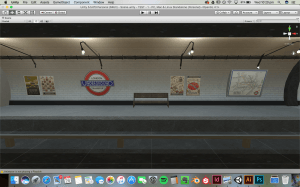
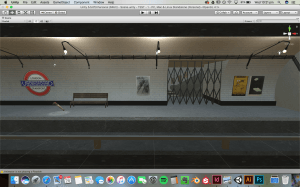
1940s
This station is perhaps the most ‘busy’ station as I had the most material to work with when designing it. As most Tube stations during WW2 were used as air raid shelters I wanted to have a platform on the Blitz. The air raid sirens can be heard in the tunnel ambiance and the platform has an eerie feel to it.
The posters are all from the wartime, some about the war and some just generic. I also added in extra models like the benches, lantern, bag and sandbags.The style of the platform itself, such as the tiles and underground sign, is based on the below pictures of Piccadilly circus during WW2.
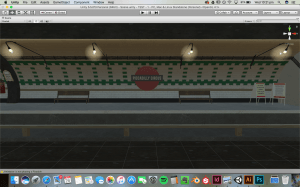
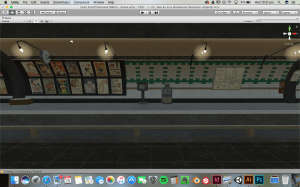
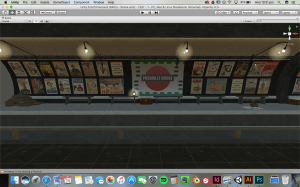
1950s – 1960s
In 1952 the first aluminum train enters service. I wanted to have a tube train in the game that the character could climb into and move in and out of the carriages. Sadly I really struggled to find a free model of a London underground tube train, and I knew I wouldn’t have the time to model one entirely myself. So I ended up taking a subway train and retexturing it as best I could to match the aluminum trains of the 50s and 60s.
Although the shape of the interior and exterior of the train are not quite correct I think that the effect is near enough.
I also added some graffiti to the last carriage as in the late 60s early 70s the underground developed a problem with vandalism.
In this section the colliders on the train are very specifically set so that she can only climb up into the train if she is at a door.
1970s – 1980s
This platform is quite dark and a low point in the undergrounds history. In 1975 a fatal accident on the Northern line at Moorgate kills 43 people and in 1987 the Kings Cross fire killed 31 people. This platform is in ruins with a lot of fire and soot and is set on a Kings Cross platform however it could also symbolize the Moorgate train crash. The escalators as the end of the platform are also on fire as the wooden escalators are what caused the Kinds Cross fire. These accidents influenced the London Underground to heavily rethink health and safety so the next platform embraces that change.
To fit in with the theme and the feeling of the platform the majority of the posters are 70s horror movie posters.
Also, notice that the lights have changed to a more modern style and the addition of the platform name banners across the tiles. And the white line at the edge of the platform.
On this platform the fire ext item that the player can pick up is also a trigger to turn the sprinklers on, thus putting the fire out and allowing the character to proceed through the narrative. This is done by using several particle emitters. First, there is the script that allows the player to pick up the fire extinguisher.
Then there is the script that turns the sprinkler particle emitter on, the audio of the sprinkler is also attached.
Then there is the script that turns the fire off and deletes the collider attached to it so that the player can move through.
1990s – 2000s
This platform is very current with the posters on the walls of west end shows and big blockbuster movies. There are also posters from some of the London Undergrounds most recent campaigns from the Boat Race and the Olympics. In 1994 penalty fares are introduced and In 2003 the Oyster card is introduced and busking is legalized. The drum set at the end of the platform, with a hat on the floor and some money symbolizes buskers on the underground.
On July 7th, 2005, 52 people were killed in bomb attacks on three Tube trains. However, I chose to not makes a reference to this in the game as I wanted it to end on a high point instead of a low. However, a slight nod to it is the addition of security surveillance cameras on the platform.
I have added a number of safety precautions that we have today, the main one being the addition of the yellow line on the platform edge.
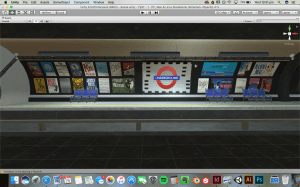
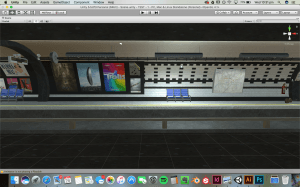
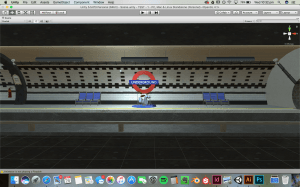
2000s +
The final platform of level one ends with the textured tube train in the modern day current style complete with the interior.
This is the last platform, at about half way the ‘Level One Complete’ screen will come up to signify the end of the game.
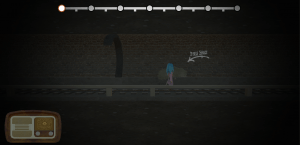
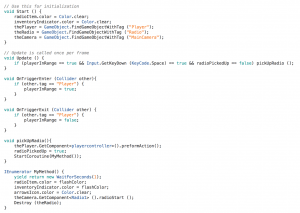
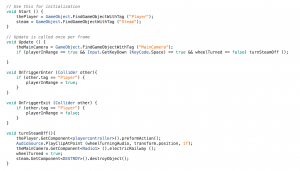
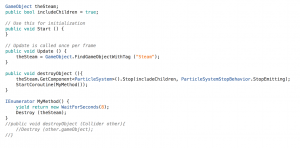
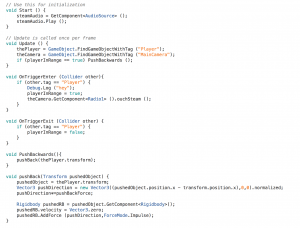
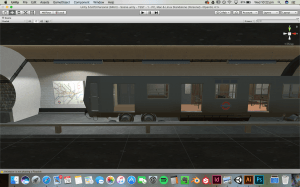
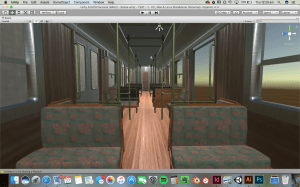
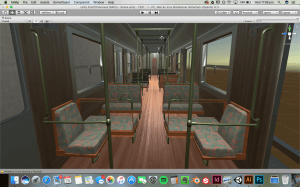
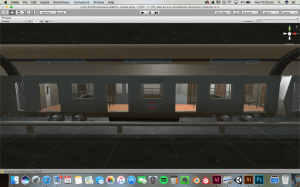
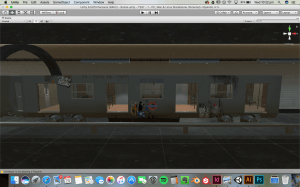
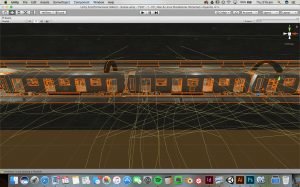
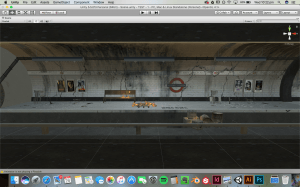
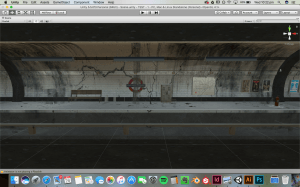
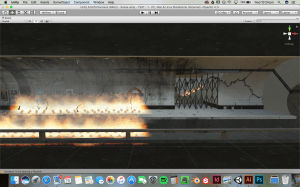
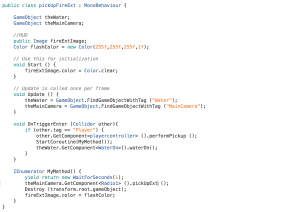
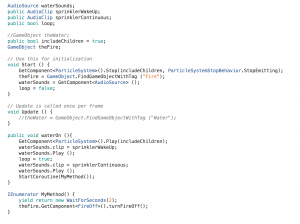
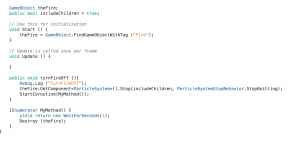
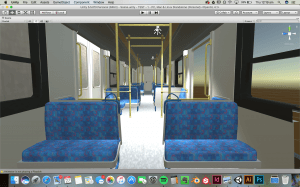
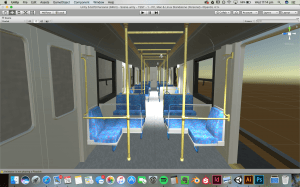
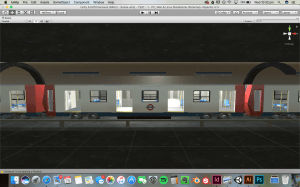
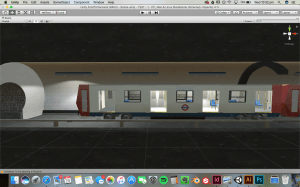
Leave a comment